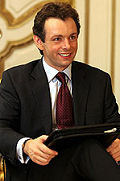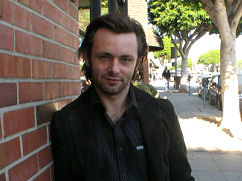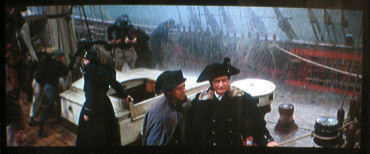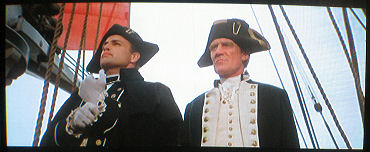Despite recent vigorous efforts by Paramount and Universal to promote World Trade Center and United 93, respectively, as Best Picture contenders, “an Oscar consultant not connected to either film” said to Hollywood Wiretap‘s Pete Hammond a few days ago that “this expensive grab for renewed attention by both films will result in a wash as neither is likely to get into the Best Picture circle.” Maybe not — I don’t entirely agree with whoever said this — but if sheer moviemaking craft mattered to anyone (and I don’t mean the application of nuts- and-bolts know-how but the knack of knowing how to make a picture work in just the right way so what it’s saying comes through without obstruction), United 93 would, no question, be a slam-dunk contender. The reason it’s not being talked up much is because a lot of people out there refused to go see it. I almost used the word “babies” but I thought better of it.
Day: October 28, 2006
Michael Sheen
I sat down with Michael Sheen, a.k.a. Prime Minster Tony Blair in The Queen, for a quick lunch on Friday afternoon. I’ll be writing something about it tomorrow or Monday, as the recording of our chat was mostly ruined by clattering dishes and the loud, insistent voices of three or four women sitting two tables away. I don’t know if they were drinking wine or not, but they sounded like they were. At least they didn’t shriek with laughter. Not too much, I mean.
I can at least say two things about Sheen, who’s a very easy bloke to talk to. He seems more and more favored to emerge as one of the five Best Supporting Actor contenders for his performance in Stephen Frears‘ film. (And I’m not just saying that.) And perhaps even more importantly, the odds are very likely that he’ll portray David Frost in Ron Howard‘s feature version of the hit London play “Frost/Nixon”, to which Sheen will be returning fairly shortly, and in which he’ll continue to costar in (along with Frank Langella, I think) when it opens in New York City next March.

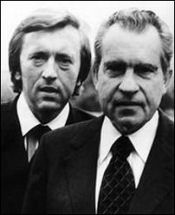
Negative publicity
“The TV networks don’t want you to see ads for the Dixie Chicks documentary Shut Up and Sing. The movie theater chains don’t want you to see the fictionalized polemic Death of a President. The president of Kazakhstan doesn’t want you to see Borat. Just ask the people promoting the movies. Hollywood appears to have hit upon a fail-safe strategy for getting attention for just about any kind of film: get someone, anyone, to try to suppress it, and then rush to the news media with breathless warnings about the First Amendment coming under attack.” — from David Halbfinger‘s 10.27 piece in the N.Y. Times.
James on DiCaprio
“In a film with a wealth of strong actors — including Jack Nicholson as the crime boss and Matt Damon as a policeman in his pocket — there is scarcely a weak link (well, a couple of over-the-top Nicholson moments). But no one is better in The Departed than Leonardo DiCaprio,” writes N.Y. Times columnist Caryn James in Sunday’s edition. “His role is central, and the film would collapse without him.
“His character, Billy Costigan, is a smart guy who has to infiltrate a crime ring and act a little less smart in his undercover guise. He erupts in sudden violence, and his cropped hair minimizes DiCaprio’s movie-star glamour. But the performance goes deeper than those external clues. He shows in his eyes the undercover agent’s fear and revulsion, a fear he has to reveal to the camera yet conceal from the mobsters in the room. We see the difference between that fear and the confusion he sometimes displays in his role as the mob’s newest member, full of braggadocio. And we see how he is torn by stress almost, but not quite, to the breaking point.
DiCaprio has “mastered an art that looks simple on screen but is immensely sophisticated: he is often best when playing devious characters who are themselves playing roles, letting us see the layers behind the facade of the con man or the undercover cop. The Departed is his most substantial take on that kind of slippery character.”
Cocaine Cowboys
Billy Corben‘s Cocaine Cowboys (Magnolia) is fast and whiplashy — a 118-minute roller-coaster ride through the world of big-time Miami cocaine dealing 20, 25, 30 years ago…whew! I liked it start to finish and so did a lot of others (it’s running 82% on Rotten Tomatoes), but no review I’ve read so far has mentioned two very obvious points, so allow me.
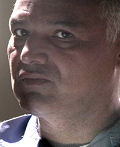


(l. to r.) Jorge “Rivi” Ayala, Mickey Munday, former cocaine dealer Jon Roberts
(1) If you’re any kind of fan of Brian De Palma‘s Scarface (’83), an operatic chronicle of the rise and fall of Al Pacino‘s Cuban-born, Miami-residing cocaine gangster Tony Montana, you have no choice but to see Corben’s film because it gives you what the actual Scarface world was really like: manic, blood-soaked and ferocious beyond any concept of restraint. In fact, Corben’s film shows what a tea-and-crumpets party Scarface‘s story was, relatively-speaking, in terms of the mayhem. The real deal was insane, relentless…too much to pack into a single drama because viewers would either get bored or turned off by all the blood, or they simply wouldn’t believe it.
(2) No Hollywood-movie assassin has ever resembled Jorge “Rivi” Ayala, the top-dog hit man who worked for the most cranked-up cocaine boss of them all — Columbian Godmother Griselda Blanco (a woman who also ignored the rule of “don’t get high on your own supply”). Hollywood hit men always exude some form of malice or cold-bloodedness or sadism or twitchiness…something actor-ish, in other words. Rivi, on the other hand, is smooth-spoken, affable and fairly charming. He could be a Porsche salesman at a big South Beach dealership, or a city coun- cilman. I’ve never knowingly spoken to an assassin in my life, but I’ve somehow always known that the hit-men portrayals I’ve seen in various action movies weren’t right. Rivi is the proof.
Two other thoughts were circlulating as I watched Cocaine Cowboys: what’s so bad about delivering a harmful drug to willing consumers of same, and why don’t gang- sters ever wise up and sock some of their money away in a Swiss bank account while the getting is good?
One of the film’s more appealling talking heads is a former transporter named Mickey Munday — strictly a guy who would fly to Columbia to pick up a shipment and fly it back to Florida. Munday “sees the whole period as a great adventure,” Corben told me. “He regrets the prison time, but he feels no more complicit in the drug trade than Fed Ex is for the industries they’re shipping for. His attitude is, ‘I picked up a product and I didn’t sell anything.’ He enjoyed the chal- lenge and the adventure of it.”
We all know our society condones the taking of certain drugs that lead to self- destruction and the harming of innocents (family members, drivers on the road, people breathing in second-hand smoke) and yet condemns the taking of other substances and hands out long prison sentences to people who provide same. As long as they don’t drive or get near me, people should be entitled to drink, snort or smoke whatever poison they choose. I agree with Munday — there was nothing all that “wrong”, if you judge by a societal curve, about a pilot doing what he did.
Talk to anyone who knows anything about the life of a criminal, and they’ll all tell you bad guys don’t last any more than five to ten years, tops. Every last one gets killed or nailed by the law. The big cocaine-trade earners of the late ’70s and early ’80s brought in tens of millions. You’d think at least one or two of them would have put a few million into a numbered bank account somewhere so they could go off and live nicely once it’s all over. I asked Corben if any of his talking head survivors had thought this far ahead, and he said none had — or at least, none have copped to it.
The Cocaine Cowboys website has it all — names, chronologies, mini-bios, criminal records, etc. Very nicely designed.
“Bounty” DVD arrives
I received Warner Home Video’s five-disc Marlon Brando Collection yesterday (it’ll be in stores on 11.7), and spent most of last night watching Mutiny on the Bounty, Julius Caesar, Reflections in a Golden Eye, Teahouse of the August Moon and The Formula. The first three, actually; I can’t stand the latter two (can anyone?), especially Teahouse.
While Mutiny doesn’t play quite as rousingly as I remembered — I’d forgotten how foppy and buffoonish Brando’s Fletcher Christian character is, and how frequently his contentious relationship with Trevor Howard‘s Captain Bligh is played for easy laughs during the first 100 minutes — the extremely wide 2.76 to 1 Ultra Panavision image, shot by Robert Surtees and derived from the original 70mm elements, is really quite beautiful, and the colors are full and luscious.
But the image is so wide (and so narrow in terms of height) that one really needs an extra-large screen to fully appreciate it. It seems too compact on my 36″ Sony flat screen. What I need to do is find someone with a high-def DVD player and a 60″ plasma screen and get myself invited to a viewing party when they purchase a high-def DVD version of this new Bounty. I’ll bring along some Chinese takeout and a bottle of wine.
My difficulties with the jokey humor aside, I have to acknowledge this scene between Howard and Brando, and pay my respects to the way Brando pauses ever so slightly before and after he says the word “fight”. It’s the film’s wittiest moment — the only line that made me laugh out loud.
The decision not to offer a “making of” documentary definitely lessens the interest in this particular DVD. (The main doc on the second disc is called “After the Cam- eras Stopped Rolling: The Journey of the Bounty” — a dull tale about the making of the ship.) It’s a real shame that WHV went the cheapie route in view of the fact that Mutiny on the Bounty‘s production history was one of the most expensive and out-of-control in Hollywood history, and therefore worth recounting for history, like any calamitous event.
Production was marked by constant tempest (Sir Carol Reed, the first director, was let go, and his successor, Lewis Milestone, quit), cost over- runs and Brando’s egoistic big-star behavior. It was almost as prolonged and costly as the shooting of Cleopatra, which opened seven months after Bounty.
Fox Home Video included an ambitious making-of-Cleopatra doc along with their Cleopatra disc three or four years ago, and it’s a far more engaging thing to watch than the film itself. Too bad WHV didn’t follow suit. Laurent Bouzereau or someone on his level could’ve really gone to town with it.
Baldwin’s “Webster” is Back
This isn’t news to readers of IMDB postings, but one of the all-time saddest orphans of Movies-in-Limbo Land — The Devil and Daniel Webster, which Alec Baldwin directed and costarred Anthony Hopkins, himself and Jennifer Love Hewitt — will be released in ’07 by The Yari Group, or roughly six years after this modern-day (hah!) rehash of Stephen Vincent Benet‘s story and Archibald Macleish‘s play finished lensing.

Look at the stills of Baldwin as he appeared while directing the film and compare them to how he looks today — he was a kid! Hopkins hadn’t made Hannibal, Red Dragon or The Human Stain when TDADW was shot, and Hewitt’s feature film career hadn’t yet gone into the crapper. It’s a pre-9/11 nostalgia movie. Here’s a YouTube trailer.
Yari apparently intends to release the film with Alan Smithee as the credited director, since Baldwin renounced it eons ago because his edit of the film was taken away and recut, apparently because the original jerkwater producers felt it wasn’t funny or commercial enough. Baldwin reportedly wanted a dramatic ensemble piece while the editors changed the tone and pacing and tried to hawk it as a comedy.
The original producers also apparently got into dutch for reporting fraudulent financial information to the IRS and therefater went bankrupt. The film had it’s premier in Florida in April 2004 at the World Cinema Naples Film Festival. A Beverly Hills company called My Own Worst Enemy Productions has apparently bought the rights (the movie is on their website — company rep Michael Golland didn’t call me back), and in turn has apparently pacted with Yari to get it into theatres.
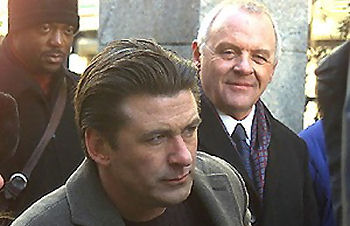
The plot’s about an unsuccessful writer (Baldwin) selling his soul to the devil (Hewitt) in exchange for fame and fortune. When his success isn’t everything he thought it would be he attempts to wiggle out of the deal, which leads to Daniel Webster (Hopkins) to defend him in a kind of cosmic court setting.
How bad is The Devil and Daniel Webster? It may actually be watchable. An IMDB poster has written there were three versions of this film. He saw the original and says it “left a lot to be desired.” But there were two more versions, one after Baldwin abandoned ship and the last one just before it was sold to Yari. The guy says “that the final cut, a half-hour shorter that the previous ones, is by far the best!” So it may be passable, but never trust anyone who uses exclamation points to convey enthusiasm about anything.
Webster was screened at the 2003 Cannes Film Market, and, acccording to the IMDB, opened commercially in Russia on 8.7.03.
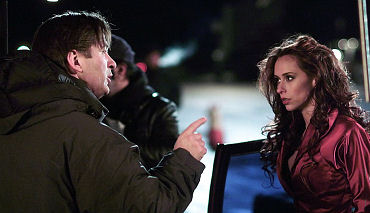
But if you go by the general rule that the more producers a film has the worse it is, then Webster is a super-stinker. There are 17 producers of varying importance and credibility listed on the IMDB: Alec Baldwin, Tony Cataldo, Terry Chase Chenowith, Jonathan Cornick, Katie Daily, Craig Darian, Randall Emmett, George Furla, Carol Gillson, David Glasser, Michael Z. Gordon, Michael S. Grayson, Brian R. Keathley, Dessie Markovsky, Adam M. Stone, Scott G. Stone (are they brothers?), Jeff G. Waxman (i.e., line producer) and Jason Zelin.
Weekend numbers
The weekend projections are in and aside from Saw 3 being the #1 dog-of-all-dogs (a projected $32,984,000 by Sunday night, which indicates a heavy Friday-to-Saturday falloff given the opening-day tally of $14 million- something), the omens are bad for Clint Eastwood‘s Flags of Our Fathers and Phillip Noyce‘s Catch a Fire, and very good for Alejandro Gonzalez Innaritu‘s Babel .
Despite Flags having added 300 screens this weekend for a total of about 2100, it’s expected to take in only about $6,023,000, which is a drop of just over 40% from last weekend’s haul of $10,749,000. Catch a Fire has opened very weakly — one could almost say disastrously — with a projected $2,029,000, or roughly $1565 per print. And yet Babel, which opened on only 7 screens this weekend, will tally a remarkable $378,000, which works out to $54,000 a print — a very strong showing.
The Prestige will take the #2 slot with $9,408,000, off 39% from last weekend…which isn’t half bad. The Departed, off a modest 32%, will take in $9,104,000 for a $90 million cume by Sunday night. Flags will finish fourth. Open Season will end up fifth with $5,616,000. Man of the Year is sixth with $4,517,000. The Grudge 2 will take in $3,590,000. Marie-Antoinette will finish up with $2,829,000 on Sunday night — a not-good drop of 51% from last weekend’s opener. Runnning With Scissors expanded its run by roughly 600 theatres with a projected total of $2,429,000, or roughly $4100 a print, also not good.
Newmarket’s Death of a President will end up with $214,000 from bookings in 91 situations and a per-screen average of $2381 — pretty weak.
Sean Smith on “Babel”
“Before I read any more reviews and start questioning my judgment, I’m going to predict that Babel will be nominated for best picture this year. What’s more, I think it just might win,” says Newsweek‘s Sean Smith in a 10.27 posting. “Why? Because the Oscar is almost always awarded from the heart rather than from the head. Pulitzers Prizes and Nobel Prizes and National Book Awards are doled out, in general, for intellectual achievement — they reward how a piece of work makes us think about the world. But the deepest value of movies is how intensely they make us feel.
“Babel could only have been made in a post-9/11 world, and it is a powerful comment on our cross-cultural anxieties and our assumptions and fears about each other. It also features mesmerizing performances, including the most natural, raw and memorable scene of Brad Pitt’s entire career. Yes, maybe the film is melodramatic. Maybe too many bad things happen to too many good people. But there is also a sense at the end of the film that most of these characters will survive their tragedies and will manage to find some measure of happiness — that there is hope for them and, by extension, us.
“Babel may be painful, but it is not bleak. Ultimately, though, the reason I think Babel could win best picture has nothing to do with what I think about it at all. It’s because watching Babel in a packed theater last month, I felt the same rush I had watching American Beauty, Shakespeare in Love and Million Dollar Baby. I can’t rationalize it. I can’t quantify it. I can barely explain it. All I can tell you is that, as sappy as it sounds, those films — and this film — made me feel as if my heart had expanded.
“Judging from all the people crying around me, and in the elevator afterward, and in the parking garage after that, I suspect that I am not alone. All of that may mean nothing. It’s just a feeling. But this year, at least, I’m not going to ignore it.”

